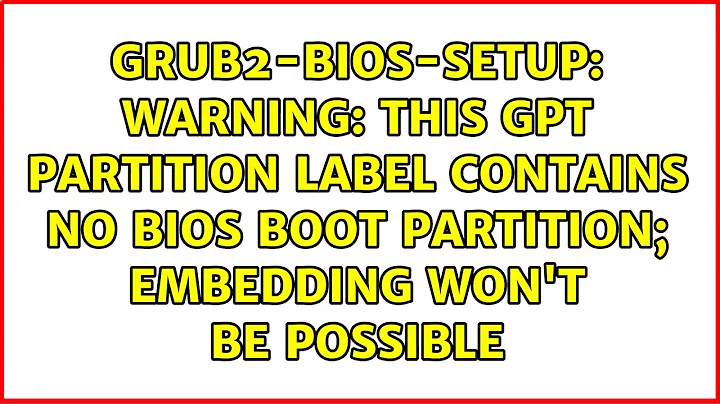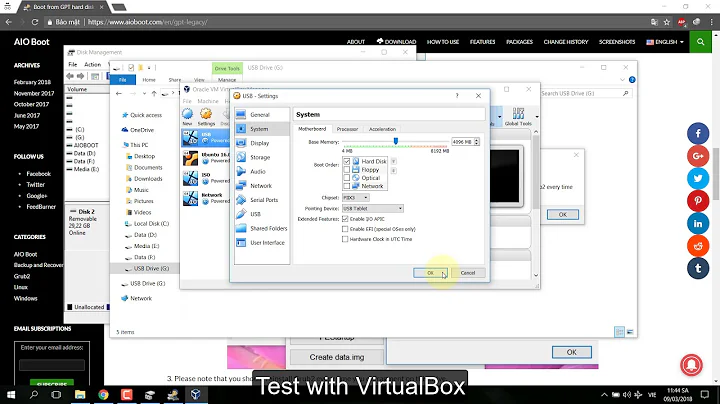Grub-install: embedding is not possible in Bios/GPT
Hmm ... apparently this line was the clue:
grub-install: warning: Attempting to install GRUB to a disk with multiple partition labels. This is not supported yet..
Previously I had installed btrfs directly on /dev/sda and /dev/sdb. That's why both of them had a FSTYPE and LABEL attached (as shown in lsblk).
Solution: I have now wiped both /dev/sda and /dev/sdb with hdparm (Secure Erase). There is probably a better way to unset those flags ... but this worked for me.
Related videos on Youtube
fho
Updated on September 18, 2022Comments
-
fho over 1 year
I am struggling with setting up an encrypted NAS for some days now. The basic plan is to have btrfs on lvm on luks on raid1 with lvmcache in writeback mode thrown in for the root partition to reduce disk access.
TL;DR:
After setting up the partitions and filesystems
GRUBfails to install with:grub-install: warning: Attempting to install GRUB to a disk with multiple partition labels. This is not supported yet.. grub-install: error: embedding is not possible, but this is required for RAID and LVM install.
Partitions
Following the Arch Wiki I start by setting up the partitions:
gdiskoutput for /dev/sda and /dev/sdb:Disk /dev/sda: 976773168 sectors, 465.8 GiB Logical sector size: 512 bytes Disk identifier (GUID): 9EFA6587-E34F-4AC1-8B56-5262480A6C6A Partition table holds up to 128 entries First usable sector is 34, last usable sector is 976773134 Partitions will be aligned on 2048-sector boundaries Total free space is 2014 sectors (1007.0 KiB) Number Start (sector) End (sector) Size Code Name 1 2048 4095 1024.0 KiB EF02 BIOS boot partition 2 4096 976773134 465.8 GiB 8300 Linux filesystemNote the BIOS boot partition that is apparently required by
GRUBwhen installing inBIOS/GPTmode.MDADM
As I have two disk I want them in a
RAID1array:mdadm --create --level=1 --raid-devices=2 /dev/md0 /dev/sda2 /dev/sdb2 root@archiso ~ # mdadm --detail --scan ARRAY /dev/md0 metadata=1.2 name=archiso:0 UUID=bdfc3fea:f4a0ee6d:6ac08012:59ea384b root@archiso ~ # cat /proc/mdstat Personalities : [raid1] md0 : active raid1 sdb2[1] sda2[0] 488253440 blocks super 1.2 [2/2] [UU] [>....................] resync = 2.0% (9832384/488253440) finish=96.6min speed=82460K/sec bitmap: 4/4 pages [16KB], 65536KB chunk unused devices: <none>LUKS
Next I setup a
LUKSvolume on top of theRAID:root@archiso ~ # cryptsetup luksFormat /dev/md0 WARNING! ======== This will overwrite data on /dev/md0 irrevocably. Are you sure? (Type uppercase yes): YES Enter passphrase: Verify passphrase: root@archiso ~ # cryptsetup luksOpen /dev/md0 md0-crypt Enter passphrase for /dev/md0:LVM
Btrfssnapshots could be used instead ofLVM, but as of writing this there is no way to add a SSD caching device toBtrfs. So I opted to useLVMand add the SSD vialvmcachelater:(Creating the volume group in one step:)
root@archiso ~ # vgcreate vg0 /dev/mapper/md0-crypt Physical volume "/dev/mapper/md0-crypt" successfully created Volume group "vg0" successfully created root@archiso ~ # lvcreate -L 100M -C y vg0 -n boot Logical volume "boot" created. root@archiso ~ # lvcreate -L 20G vg0 -n root Logical volume "root" created. root@archiso ~ # lvcreate -L 10G vg0 -n var Logical volume "var" created. root@archiso ~ # lvcreate -L 6G -C y vg0 -n swap Logical volume "swap" created. root@archiso ~ # lvcreate -l +100%FREE vg0 -n home Logical volume "home" createdResulting in the following layout:
root@archiso ~ # lvs LV VG Attr LSize Pool Origin Data% Meta% Move Log Cpy%Sync Convert boot vg0 -wc-a----- 100.00m home vg0 -wi-a----- 429.53g root vg0 -wi-a----- 20.00g swap vg0 -wc-a----- 6.00g var vg0 -wi-a----- 10.00gBtrfs/Filesystems
Creating the filesystems:
root@archiso ~ # mkfs.ext4 /dev/vg0/boot root@archiso ~ # mkfs.btrfs /dev/vg0/home root@archiso ~ # mkfs.btrfs /dev/vg0/root root@archiso ~ # mkfs.btrfs /dev/vg0/var(
ext4was chosen for boot becausebtrfscomplains about the small partition size.)Mounting the filesystems:
root@archiso ~ # swapon /dev/vg0/swap root@archiso ~ # mount /dev/vg0/root /mnt/arch -o compress=lzo root@archiso ~ # mount /dev/vg0/home /mnt/arch/home -o compress=lzo root@archiso ~ # mount /dev/vg0/var /mnt/arch/var -o compress=lzo root@archiso ~ # mount /dev/vg0/boot /mnt/arch/bootInstalling Arch
Actually I just copy the system from a previous backup:
root@archiso ~ # rsync -Pa /mnt/bkp/sda/* /mnt/arch(coffee break)
Setting up mdadm.conf and fstab
root@archiso ~ # genfstab -U /mnt/arch > /mnt/arch/etc/fstab root@archiso ~ # cat /mnt/arch/etc/fstab # /dev/mapper/vg0-root UUID=62ebf0c9-bb37-4b4e-87dd-eb8a4ace6a69 / btrfs rw,relatime,compress=lzo,space_cache 0 0 # /dev/mapper/vg0-home UUID=53113e11-b663-452f-b4da-1443e470b065 /home btrfs rw,relatime,compress=lzo,space_cache 0 0 # /dev/mapper/vg0-var UUID=869ffe10-7a1c-4254-9612-25633c7ae619 /var btrfs rw,relatime,compress=lzo,space_cache 0 0 # /dev/mapper/vg0-boot UUID=d121a9df-8c03-4ad9-a6e0-b68739b1a358 /boot ext4 rw,relatime,data=ordered 0 2 # /dev/mapper/vg0-swap UUID=29035eeb-540d-4437-861b-c30597bb7c16 none swap defaults 0 0 root@archiso ~ # mdadm --detail --scan >> /mnt/arch/etc/mdadm.conf root@archiso ~ # cat /mnt/arch/etc/mdadm.conf [...] ARRAY /dev/md0 metadata=1.2 name=archiso:0 UUID=bdfc3fea:f4a0ee6d:6ac08012:59ea384bChrooting into the system
root@archiso ~ # arch-chroot /mnt/arch /bin/bash [root@archiso /]#mkinitcpio.conf
These hooks were added:
mdadm_udev encrypt lvm2 btrfs[root@archiso /]# mkinitcpio -p linuxConfiguring GRUB
Now for the interesting (and failing) part, I chose
GRUBas my bootloader as it should support all of the contraptions that I use.References:
- https://wiki.archlinux.org/index.php/Dm-crypt/Encrypting_an_entire_system#LVM_on_LUKS
- http://www.pavelkogan.com/2014/05/23/luks-full-disk-encryption/
Changed parts in
/etc/default/grub:GRUB_CMDLINE_LINUX="cryptdevice=/dev/md0:vg0" GRUB_ENABLE_CRYPTODISK=yInstalling grub:
[root@archiso /]# grub-install --target=i386-pc --recheck /dev/sda Installing for i386-pc platform. /run/lvm/lvmetad.socket: connect failed: No such file or directory WARNING: Failed to connect to lvmetad. Falling back to internal scanning. /run/lvm/lvmetad.socket: connect failed: No such file or directory WARNING: Failed to connect to lvmetad. Falling back to internal scanning. /run/lvm/lvmetad.socket: connect failed: No such file or directory WARNING: Failed to connect to lvmetad. Falling back to internal scanning. grub-install: warning: Attempting to install GRUB to a disk with multiple partition labels. This is not supported yet.. grub-install: error: embedding is not possible, but this is required for RAID and LVM install.(
--debugoutput available here)Frankly ... I have no idea what's the problem here. In BIOS/GPT mode GRUB should embed it's core.img into the
ef02/BIOS bootpartition shouldn't it?Edit
https://bbs.archlinux.org/viewtopic.php?id=144254 doesn't apply here:
[root@archiso /]# btrfs fi show --all-devices Label: none uuid: 62ebf0c9-bb37-4b4e-87dd-eb8a4ace6a69 Total devices 1 FS bytes used 965.77MiB devid 1 size 20.00GiB used 3.04GiB path /dev/mapper/vg0-root Label: none uuid: 869ffe10-7a1c-4254-9612-25633c7ae619 Total devices 1 FS bytes used 339.15MiB devid 1 size 10.00GiB used 3.04GiB path /dev/mapper/vg0-var Label: none uuid: 53113e11-b663-452f-b4da-1443e470b065 Total devices 1 FS bytes used 384.00KiB devid 1 size 429.53GiB used 2.04GiB path /dev/mapper/vg0-home Btrfs v3.17.3 -
derobert over 9 yearsYou could probably use e.g.,
ddto just wipe the first & maybe last few megabytes. Moot point now, of course. -
fho over 9 yearsYep ... thought about that first ... but then found out about the Secure Erase features :)


![[Fixed] Grub Install Fatal Error in Ubuntu 20.04 LTS [Updated 2021]](https://i.ytimg.com/vi/fleF4qDtwDE/hq720.jpg?sqp=-oaymwEcCNAFEJQDSFXyq4qpAw4IARUAAIhCGAFwAcABBg==&rs=AOn4CLBPECtfGm0mQOcMunxwh9m6_Ktaiw)


